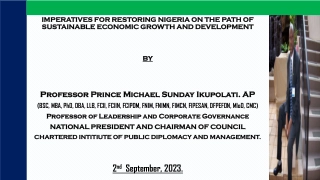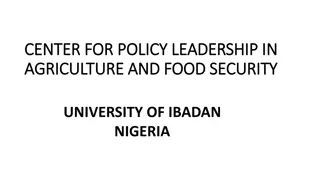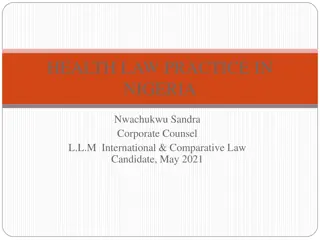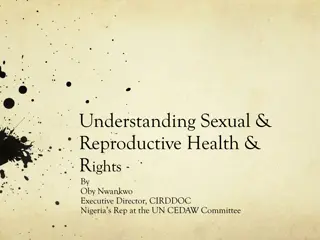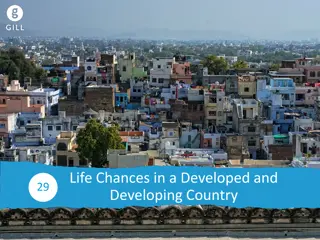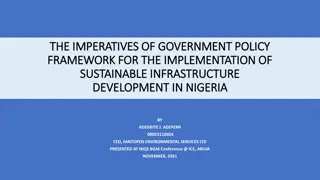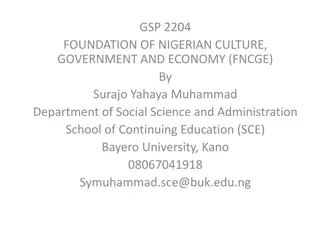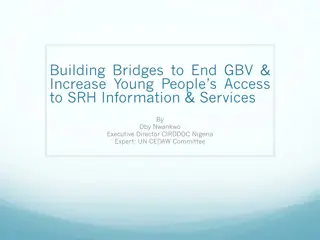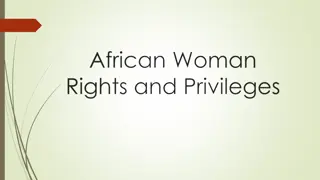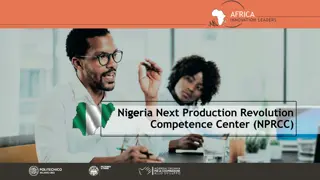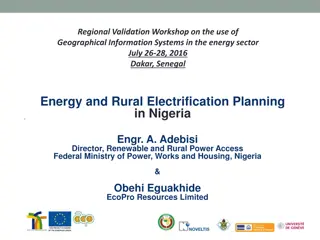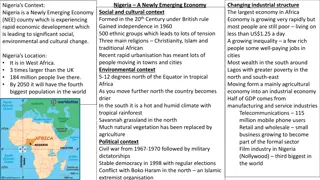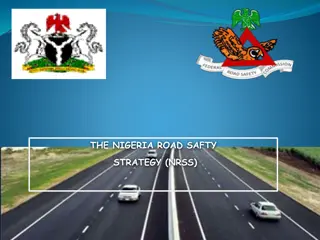Analysis of Education and Development in Nigeria
Scholars emphasize the crucial link between education and development in Nigeria, reflecting on the historical progression since the country's pre-colonial era and amalgamation. This module delves into the impact of language, policies, and various stakeholders in education financing. It explores education as a fundamental pillar for socialization and national progress, shedding light on the evolving curriculum and evaluation methods.
Download Presentation

Please find below an Image/Link to download the presentation.
The content on the website is provided AS IS for your information and personal use only. It may not be sold, licensed, or shared on other websites without obtaining consent from the author.If you encounter any issues during the download, it is possible that the publisher has removed the file from their server.
You are allowed to download the files provided on this website for personal or commercial use, subject to the condition that they are used lawfully. All files are the property of their respective owners.
The content on the website is provided AS IS for your information and personal use only. It may not be sold, licensed, or shared on other websites without obtaining consent from the author.
E N D
Presentation Transcript
2019/2020 GSP Module 9 FNC Lectures A Historical Analysis of Education and National Development in Nigeria
Aim/Objectives of the module Basic knowledge on types of Education Little History of Education in Nigeria Policy on Education in Nigeria Relations between Education and Development Roles of Gov t, NGO, Donors to financing Education in Nigeria
Intruduction Scholars worldwide believe that, there is a correlation between education and development of individuals, states, nations and any language community. The popular adage, that no nation can attain purposeful development without an adequate preparation for educating its citizens has brought to the fore the importance of education. The purpose of this module is to give a brief understanding of the relationship between education, language and development. These tripod concepts are interwoven agents of complete socialization of humans. The name Nigeria is more than 100 years now, and it resulted from the joining or amalgamation of the various ethnic communities that occupy the British protectorate of North and South of the River Niger. Prior to the amalgamation in 1914 the different ethnic communities within the Northern and Southern Protectorate were living independently but mutually attached through economic and social relationships. The trade of kola, palm oil, slave trade (still the slave village known as Brazilian Baracoon is regarded as a National monument as BadagrySlave Museum), bronze and other metals opened the major cities and towns to all. Both goods and people moved freely without let or hindrance. Sequel to the amalgamation, all the more than 400 ethnic groups, and languages were reduced to mere subordinate to English which was later made the official language of all colonial activities. The native Nigerian languages are made inferior and usually referred as mere vernaculars.
Introduction; concepts definition 1.1 What is education? Education is the act or process of educating, the result of educating as determined by the knowledge, skill or discipline or character acquired; also, the act or process of training by a prescribed or customary course or discipline.
Curriculumdefined What is curriculum Curriculum means the general idea of education based on answers to what is to be taught; who is to be taught what, at what level is to be taught and through which medium is to be taught.
Evaluation/Assessment What is evaluation? Assessment or evaluation means the various ways through which teaching and learning activities are measured to ascertain its successes or failures. It could be through oral test, written test, continuous assessment and examination.
Con.t 1.2 What is a language? A Language is the cognitive ability to learn and use systems of complex communication or to describe all set of rules that make up the system . Only human language has the ability to change and develop into many sub systems guided by responsive rules. The sound system of each language is guided by certain rules. Similarly, its morphology (study of words) and semantics the study of meanings are always following specific rules.
2.0 Education in Nigeria There are 2 major types of Education 1. Indigenous Education; traditional African 2. Western Education; after western influence 3. Major differences between them Includes registration, classrooms, and many formalities
2.2 History of Western Education in Nigeria Pre Independence During Independence Pot Independence
2.2.1 Ordinances in Education in Nigeria What is an ordinance? Why is ordinances crucial in Western Education? 0rdinances in Nigeria 1942-1969 Western Region ordinances Eastern Region ordinances Northern Region ordinances Implications to Educationin Nigeria
2.3 National Policy on Education in Nigeria 1972-2014 2.3.1 NPE and Language education 2.3.2How many Nigerian Languages 2.3.3 Language Families in Nigeria 2.3.4 Official Instruction Language in Nigeria 2.3.5 Comparative language policies
3.0 Compulsory Education in Nigeria 3.1 UPE 1978 3.2UBE 1999-Date 3.3 Major implications on Education in Nigeria
4.0 Financing Education in Nigeria 4.1 Finance by Government; federal, state, and local 4.2 Role of NGO, International donors, World Bank DFID, USAID, Japan etc 4.3 Private Sector contribution to education in Nigeria
5.0 Administration of Education in Nigeria Gov/t established various institutions for easy administration of Education in Nigeria
6.0 Education and Development in Nigeria 6.1 Linguistic dimension of Development 6.2 Nigerian made Policies eg NEEDS, IQTE 6.3 International policies EFA, MDG, SDG
7.0 Problems of Education delivery in Nigeria Ethnic/cultural chauvinism Total collapse of system Misappropriation of National priorities Conflict and ethnic rivalry/bigotry amongst Nigerians Inconsistent policy adoption and continuation Corruption and non patriotic attitudes


